
Originally published via Creed Speech Substack.
As suggested in the sub-heading of this post, although this is not my typical subject matter for this Stack, I feel it is pertinent and I wish to address it. I approach this from a past life as a successful executive level recruiter who used to source CEOs, Managing Directors, CFOs, HR Directors, and many technical ‘C-level’ roles. *I never utilised ‘ghost posting’ myself – a despicable practice within the recruitment industry used by both in-house recruiters and external recruiting firms.
I also approach this article from my current struggle as a job-hunting candidate. The struggle is real and it is widespread.
The job market is a fickle old game. It was certainly much easier pre-2020 to be able to successfully reach a living, breathing, talking human being on the phone, as a candidate showing initiative to follow up on applications. Now everything is so cold and heartless, automated and detached from offering candidates the chance to qualify job leads and speak to an actual hiring manager or HR contact.
You may make the first interview, think it went great, then get completely ghosted (ignored) or receive the dreaded ‘no reply’ email:
“Whilst we cannot provide feedback, after careful consideration, we will not be progressing your application.”

This is an awful practice which is on the rise. It is when companies and recruiters post fake jobs on their websites and job-boards. Why would they do this, you ask yourself, incensed?
Job seekers rarely know what’s happening on the other side of the application. And in some cases, what’s happening is absolutely nothing. The position doesn’t even exist. It’s called a ghost job. And about half of companies list jobs they don’t necessarily intend to fill because they’re “always open to new people,” according to a survey from Clarify Capital. Kaplan said this tactic isn’t new.
“In all practical sense, it’s existed for many years and it means a number of different things,” he said.
Ghost jobs can be an innocent oversight: A recruiter puts up open positions and gets laid off or forgets to take them down once they’re filled. But sometimes employers post ghost jobs on purpose so that to investors it looks like the company is growing, and to overworked and frustrated employees it looks like help is on the way.
Legitimate companies are increasingly posting fake job listings, often referred to as ghost jobs. Four in 10 companies posted fake job listings in 2024, and three in 10 are currently advertising for a role that is not real, according to a May survey from Resume Builder.
“Ghost jobs are actually not scams. They’re from real companies, but they are openings that don’t actually exist,” said Geoffrey Scott, senior content manager and hiring manager at Resume Genius. “That company is not actually hiring for that role at this moment in time. They might be interested in hiring for that role in the future, or maybe they were hiring for it, but due to budget cuts, those roles were closed or put on hold.”
Revelio Labs, a U.S.-based workforce intelligence company, found that the rate of hires per job posting has essentially halved over the past five years. In 2019, there were eight hires for every 10 job postings. By 2024, that number had dropped to four hires per 10 job postings.

See these snippets taken from popular job-board glassdoor.com:
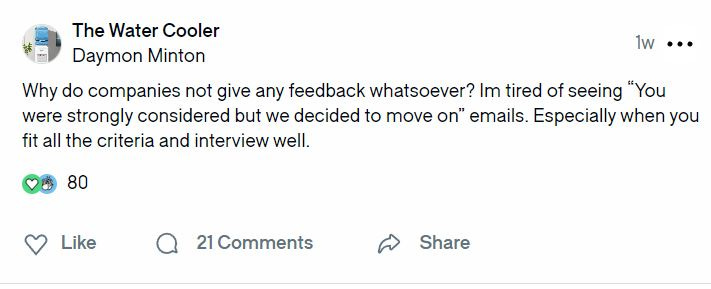
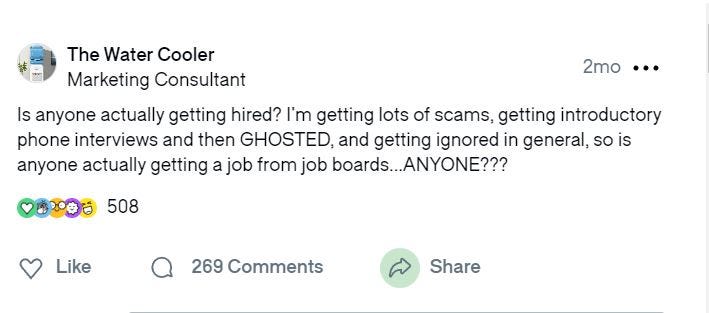
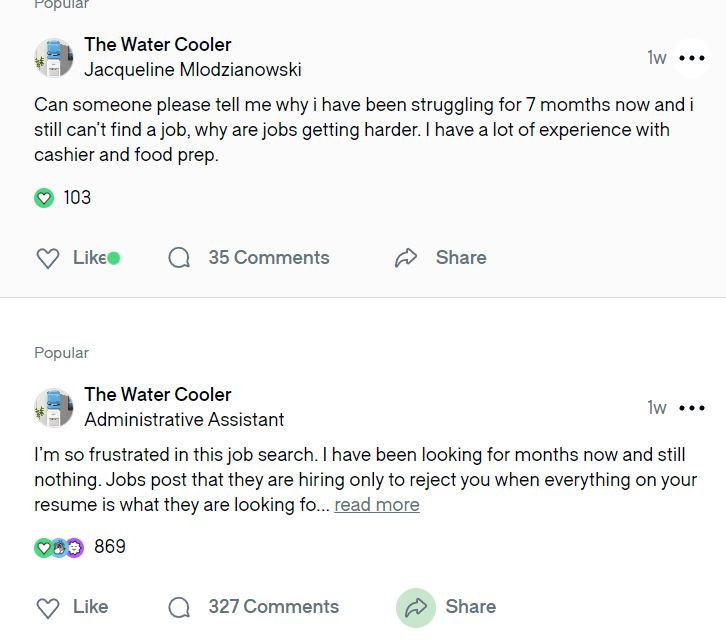
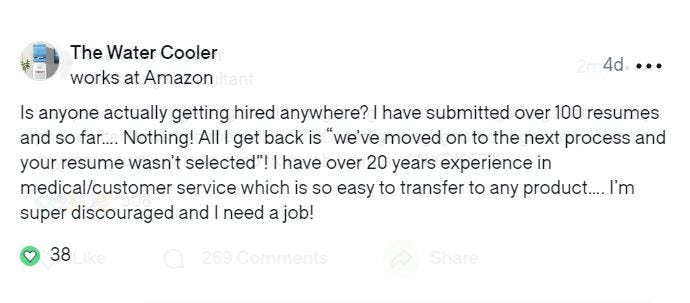
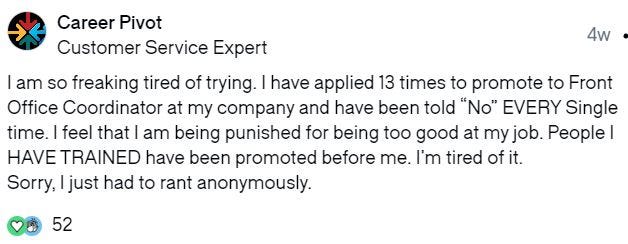
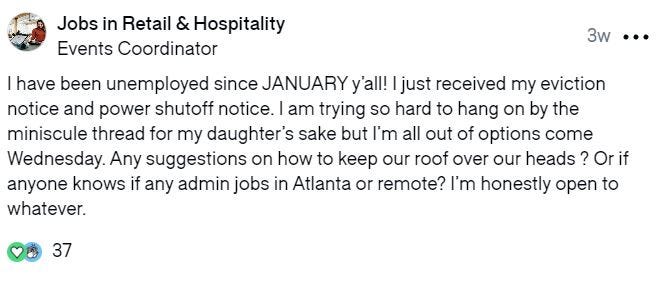
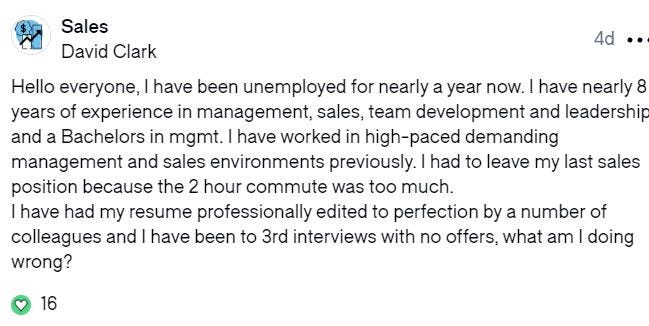

If you are persistent and manage to contact – by telephone – an actual hiring manager, recruitment manager or HR contact at the company you have applied for, they may also say “thanks for your interest, we’ll let you know if you are successful in making the interview, bye”….
Keep them on the line. Ask them the following:
If you are dealing with a recruitment company person who is sourcing candidates on behalf of an employer, you should want to find out if this job you are applying for – now in the hands of the outsourced recruiter – is a ‘general search’ or an ‘executive search’. The difference being that a general search is not exclusive to that recruiter. Many other recruiters are vying for the same candidate pool. Their commission percentage is low.
In a general search (also known as ‘contingency search’), the recruiter only gets paid upon placement of the successful candidate. Ergo, they utilise more of a scatter gun approach, chucking CVs (Resumes) at their client, and seeing what sticks. They will not put as much effort into pre-screening candidates, interview coaching, and general hand-holding throughout the application process.
If it is an executive search (also known as ‘retained search’), it means that this recruiter has exclusivity from the client. They have been paid a deposit up front by the client. Their commission upon successful placement of the candidate is much higher. They are more invested, both financially, and in terms of the time and resources made available to the recruitment process and with you, as a candidate.
They will have ‘researcher admins’ on their team, drawing up a ‘hit-list’ of candidates from relevant companies, industries, and ‘talent pools’ on their database, and via job boards and LinkedIn. Although I deleted my Linkedin presence years ago, because it just became like Facebook and I got bombarded with ads and attempts to up-sell me training workshops – LinkedIn staff were the worst spammers!
We digress.
I am approaching this from my time recruiting mostly Thais, but it is also relevant to expats too.
When a recruiter or HR hiring manager starts off by asking you to “tell me a bit about yourself” – do not launch into a monotone recital of your entire employment history from your curriculum vitae. Actively listen. They are asking about you as a person. What are your hobbies, interests, lifestyle etc – without oversharing and being too personable, you can remain professional and build some rapport here.
You should have done your research on the company, the role, the hiring managers and the executive level team of decision makers as much as is possible via their website, and *sigh* via LinkedIn.
This does not mean opportunistically weaving into the conversation soundbites about when the company was founded or how many employees they have, ad nauseam from their ‘mission statement’ and ‘core values’ webpage sections.
Perhaps you dug up some interesting articles on recent mergers and acquisitions, new product lines they are launching, new market segments they are expanding into. Maybe you can think of some intelligent questions to put to them about your research, showing initiative and interest in how this affects the future of the company’s growth and direction – save all this for the end of the interview, unless it is explicitly brought up by the interviewer, or you feel that they are leaning on you to test your knowledge of what they stand for and their common goals and objectives et cetera.
Always provide detailed examples in your answers. Actively listen. If they ask about what you achieved, what you did to solve X,Y,Z, and the steps you took, then be sure to talk about yourself and don’t be shy to take credit for those achievements. Conversely, if you are asked about your team and collective achievements, explain accordingly with specifics, measurables, timelines, and targets you were given. Prepare examples of your key achievements and problem solving anecdotes in advance of the interview. Use written notes. Either for virtual calls or in person. Keep your phone switched off and out of site. Don’t bring a laptop unless requested to do so for presentation purposes.
If you are asked the classic “tell me how you deal with failure?” or “tell me about a time you failed and what you learnt from this?” – be humble. It is reasonable to turn a ‘failure’ into a learning moment in your detailed response, yet sugar-coating it too much, whereby you explain how you magically turned a failure into a success, because, for example, you listened to the customer and resolved their issue taking steps X,Y,Z, you may come across as disingenuous and arrogant.
Questions on failure are tapping into behavioural psychology and attempting to elicit a response from a candidate that demonstrates a real acknowledgement of their mistake, how they learned from it, and how they would approach similar circumstances differently in a hypothetical future reoccurrence.
Try to get immediate feedback at the end of the interview. You could ask:
Please could you give me your initial feedback on my suitability for this role?
How do I compare to the other candidates you have interviewed so far?
What are the next steps?
When can I expect to hear back from you?

You might feel awkward asking these questions, but this is key to gather vital information. You might learn that it is a dead end if the interviewer is unwilling to say much, or just thanks you and says they will be in touch.
Whereas, if it provides a launch pad to extend the duration of the interview, with more dialogue and more questions from the interviewer expressing interest in your availability, reference requests, or other qualifying information questions, this bodes well for your application.

Email them within 24 hours of the interview thanking them for the opportunity, further expressing your interest in the role, and outlining your availability for the next round of interviews over the coming weeks.

If you want to be old-school (the best school) then write them an actual letter, post it to their head office as ‘FAO [Name]’- send it as first class recorded delivery so it reaches them quickly.
Good luck and do not give up. Aside from job boards, networking is the best way to find jobs – have you really tapped out all the contacts possible to share your CV around and ask for referrals from friends, acquaintances, former colleagues and managers?
Are there networking events in your area you could attend? Perhaps a small cost for entry. In Thailand, there are many ‘chamber of commerce’ events all the time where you can be brave and strike up conversations with people from all sorts of industries and management levels:
British Chamber of Commerce Events
German Chamber of Commerce Events
Australian Chamber of Commerce Events
American Chamber of Commerce Events
I intended this to be a short, punchy post, but it’s longer than intended. That will suffice. You can find plentiful CV templates online for free – I would be reluctant to cite any here as CV format preference differs from country to country. I hope this helps.
Bitcoin address:
bc1p0eujhumczzeh06t40fn9lz6n6z72c5zrcy0are25dhwk7kew8hwq2tmyqj
Solana address:
Ds6QpUxaWB6bJ8WF4KAazbuV25ZhPRdZh4q4BXutj4Ec
Ethereum address:
0x42A7FA91766a46D42b13d5a56dC5B01c153F1177
Monero address:
86nUmkrzChrCS4v5j6g3dtWy6RZAAazfCPsC8QLt7cEndNhMpouzabBXFvhTVFH3u3UsA1yTCkDvwRyGQNnK74Q2AoJs6